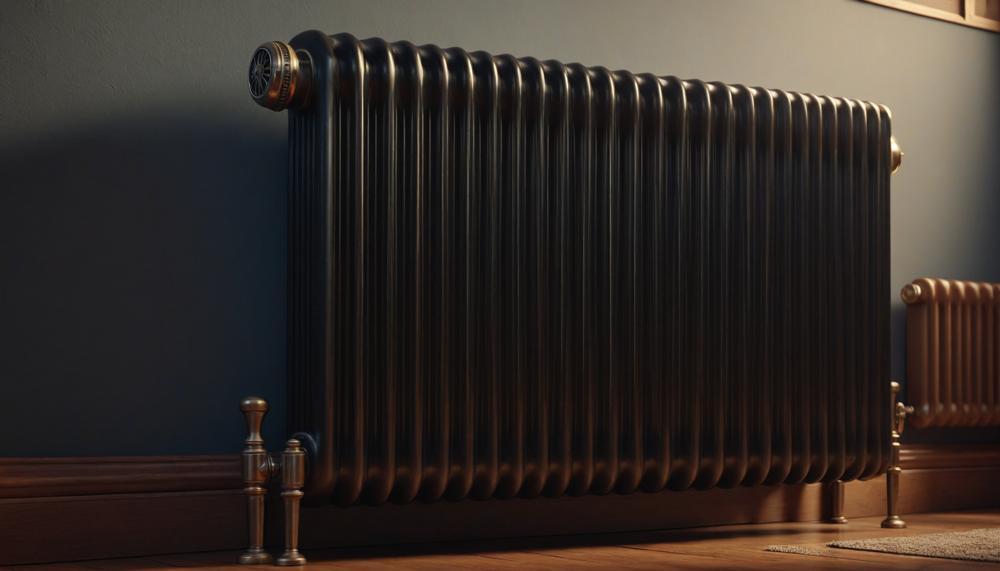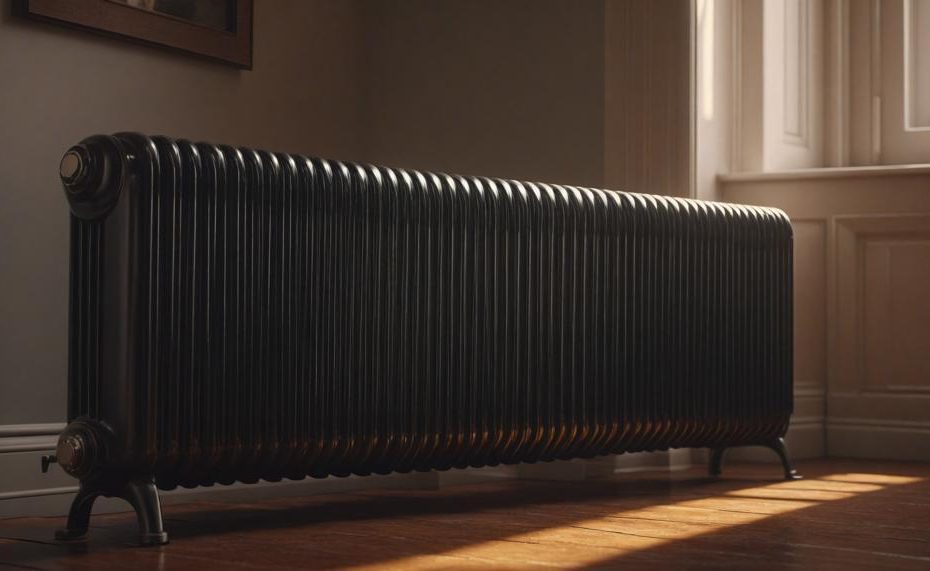Staring at an old radiator and wondering what to do with it? You’re not alone. Old radiators, while seemingly bulky and outdated, offer a range of possibilities far beyond their original purpose.
From creative repurposing projects to environmentally-friendly recycling options, the potential uses for these metallic beasts are surprisingly diverse. Here’s a snapshot of what you can do with an old radiator:
- Convert to Air Conditioners or Other Appliances: Transform your old radiator into a unique and functional air conditioner or another household appliance.
- Repurpose into Furniture or Decor: Get creative and turn your radiator into a stylish piece of furniture or a quirky home decor item like a table, chair, or lamp.
- Scrap and Recycle: Disassemble the radiator and recycle its metal parts at a local scrapyard, helping to reduce waste and support environmental sustainability.
- Sell for Scrap: Many scrapyards and companies are willing to buy radiator scraps, offering you a way to make a bit of extra cash.
- Proper Disposal of Hazardous Materials: Ensure you dispose of any hazardous waste components safely, following local regulations to protect the environment.
Whether you’re aiming to make a statement with upcycled furniture or simply looking to dispose of an old radiator responsibly, these options provide effective solutions. Recycling and repurposing not only benefit you but also contribute positively to the environment.
Let’s explore the various possibilities and turn that old radiator from a relic of the past into something truly remarkable.
Contents
What Are Old Radiators?
Old radiators, much like car radiators, are devices used to transfer heat for warming spaces. They operate by circulating hot water or steam through a network of pipes, releasing heat into the surrounding area.
These radiators are often made from cast iron, steel, or aluminium and can be quite bulky and heavy.
People need to dispose of old radiators for several reasons:
- Environmental Impact: Radiators contain coolants that are harmful to the environment if not disposed of correctly. Proper disposal ensures that these substances do not contaminate soil and water sources.
- Recycling Benefits: Radiators are composed of valuable metals that can be recycled. Recycling reduces the need for new raw materials, conserving natural resources and reducing energy consumption.
- Functional Obsolescence: Older radiators may become inefficient or break down over time, necessitating replacement with newer, more efficient models.
- Space and Aesthetics: Old, bulky radiators can take up space and may not fit the modern aesthetic of a home, prompting homeowners to replace them with more compact and stylish heating solutions.
Here are some common methods to dispose of old radiators:
| Method | Explanation | Benefits |
| Recycling | Breaking down the radiator and recycling its metal components. | Environmentally friendly, conserves resources. |
| Repurposing | Transforming the radiator into furniture or home decor items. | Creative reuse, reduces waste. |
| Scrapping | Selling the radiator to a scrapyard for metal recovery. | Monetary gain, supports recycling industry. |
| Conversion | Turning the radiator into functional items like air conditioners or heaters. | Extends the life of the materials, reduces the need for new products. |
Disposing of old radiators properly not only mitigates environmental harm but also supports sustainable practices by recycling valuable materials.
Why Dispose of Old Radiators?
Properly disposing of old radiators is paramount to safeguard the environment, conserve natural resources, and promote sustainability. Radiators contain valuable materials like copper and aluminium that can be recycled and reused, reducing the need for new raw materials.
Furthermore, improper disposal can lead to harmful contaminants leaching into the soil and water, posing significant environmental hazards.
| Reason | Description | Benefit |
| Environmental Protection | Radiators often contain hazardous substances that can harm ecosystems if not disposed of properly. | Prevents soil and water contamination, protecting wildlife and human health. |
| Resource Conservation | Recycling radiators allows the recovery of metals like copper and aluminium. | Reduces the need for mining new resources, conserving natural materials. |
| Waste Reduction | Keeping radiators out of landfills minimizes waste accumulation. | Helps maintain cleaner and more sustainable landfill sites. |
| Economic Value | Recycled materials from radiators can be sold and reused. | Supports the economy by providing materials for new products and industries. |
| Energy Savings | Recycling metals uses less energy compared to producing new metals from ore. | Reduces greenhouse gas emissions, contributing to climate change mitigation. |
To responsibly dispose of old radiators, consider donating them to scrap metal recycling facilities or selling them to repair shops or salvage yards. Ensure radiators are cleaned and contaminants are removed before recycling. Avoid throwing them in regular trash bins to prevent environmental harm.
Recycling Old Radiators
Responsible recycling of old radiators involves several eco-friendly steps that help conserve resources and protect the environment. Here’s a detailed guide on how to do it:
| Step | Action | Details |
| 1 | Donate or Sell to Recycling Facility | Find facilities that specialize in scrap metal recycling to dismantle and recycle metals. |
| 2 | Sell to Repair Shop or Salvage Yard | Extend the radiator’s life by selling it to places that repair or repurpose old radiators. |
| 3 | Choose a Reputable Recycling Facility | Ensure the facility follows proper environmental practices for disposal. |
| 4 | Remove Contaminants | Safely remove oil, coolant, and other hazardous materials before recycling. |
| 5 | Clean and Disassemble | Thoroughly clean the radiator and disassemble any parts to facilitate recycling. |
| 6 | Follow Local Regulations | Adhere to local rules for hazardous waste disposal to prevent environmental contamination. |
Recycling old radiators not only conserves natural resources but also reduces greenhouse gas emissions and prevents harmful contaminants from reaching landfills.
Donating Old Radiators
Answer: There are several organizations and charities that accept donations of old radiators. These groups often use the radiators to support low-income families, schools, community centres, and other charitable causes. Here are some notable options:
| Organization/Charity | Description | Contact Information |
| The Salvation Army | The Salvation Army accepts various household items, including old radiators, to support their programmes for those in need. | Visit their donation page for more details. |
| Habitat for Humanity | Habitat for Humanity ReStores accept old radiators and other building materials, which are sold to support affordable housing projects. | Find your local ReStore on their website. |
| Community RePaint | Community RePaint schemes take various household and building items, including old radiators, for redistribution to community projects and individuals in need. | Locate a nearby scheme through their finder tool. |
| Local Scrap Metal Dealers | Many scrap metal dealers accept old radiators for recycling. This not only helps the environment but can also provide a small financial return. | Search online for local dealers or check the Recycle Now directory. |
| Antique Dealers and Salvage Yards | Antique dealers and salvage yards may be interested in old, especially vintage, radiators. These can often be sold for a good price. | Contact local dealers or use directories such as SalvoWEB. |
Donating your old radiators not only helps the environment by reducing waste but also provides valuable resources to those in need.
Working with a Professional Heating and Cooling Contractor

Technical Expertise and Knowledge
- Professionals possess extensive training and knowledge of HVAC systems.
- They ensure safe removal and disposal of old radiators, avoiding potential hazards.
Optimal Performance and Longevity
- Proper removal prevents damage to existing HVAC systems, ensuring they function efficiently.
- Reduces wear and tear on new or remaining components, extending their lifespan.
Reliability
- Contractors offer dependable services, ensuring radiators are disposed of correctly and promptly.
- Prevents unforeseen issues that could arise from improper disposal.
Cost-Effective Solutions
- Hiring experts can save money by preventing damage and potential costly repairs.
- Proper disposal methods avoid fines or additional costs associated with improper waste handling.
Peace of Mind
- Knowing the job is handled by professionals provides reassurance.
- Eliminates the stress of navigating complex disposal regulations and logistics.
Ensuring Proper Disposal of Old Radiators
Disposing of old radiators responsibly and in an environmentally friendly way involves several key steps. Here are the best methods to ensure your radiators are disposed of properly:
- Recycle at a Scrap Metal Facility: Radiators contain valuable metals like copper and aluminium that can be reused. Take your old radiator to a scrap metal recycling facility where it will be safely dismantled and its components recycled.
- Sell or Donate: Consider selling your radiator to a repair shop or salvage yard. These businesses can refurbish and reuse the parts, giving the radiator a new life. Alternatively, you can donate it to organizations that accept used metal parts.
- Choose a Reputable Recycling Facility: Ensure that the recycling facility you choose follows regulations for proper disposal. This will help in conserving resources and reducing emissions.
- Preparation for Recycling: Before recycling, remove any contaminants or additional parts from the radiator and clean it. This makes the recycling process more efficient and safe.
- Avoid Regular Trash Disposal: Never throw radiators in regular trash. They contain hazardous materials that can contaminate soil and water, and valuable metals that should be recovered.
Proper disposal not only protects the environment from contamination but also helps in promoting sustainability. Recycling radiators prevents landfills from reaching capacity and leaking harmful substances into the environment.
Conclusion
Turning old radiators into something new and useful is not only practical but also environmentally friendly. These bulky, outdated fixtures hold untapped potential that can be unlocked through various creative and responsible methods.
One option is to transform your radiator into a unique piece of furniture or decor. With a bit of creativity, an old radiator can become a stylish table, chair, or even a lamp, adding a quirky charm to your home. For the more technically inclined, repurposing it into an air conditioner or another household appliance is another innovative way to extend its life and functionality.
If you’re looking to dispose of your radiator responsibly, recycling is a smart choice. By disassembling and recycling the metal parts at a local scrapyard, you help reduce waste and conserve valuable resources. Many scrapyards are also willing to buy radiator scraps, offering a way to earn some extra cash.
It’s important to handle any hazardous materials properly, ensuring they don’t harm the environment. Following local regulations for the disposal of coolants and other hazardous substances is crucial.
Ultimately, whether you’re repurposing or recycling, finding a new use for your old radiator not only benefits you but also supports environmental sustainability.





